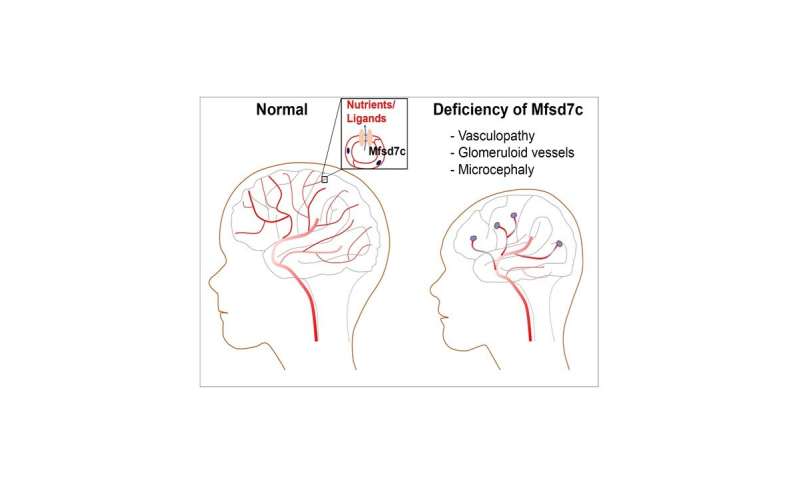
Brain blood vessels are critical networks for maintaining brain functions. These blood vessels control the exchange of nutrients, gases and waste between neuronal cells and the blood. Defects in these blood vessels result in life-threatening diseases such as stroke and brain hemorrhages. How blood vessels absorb nutrients for their own functions and how they supply the brain with essential nutrients are yet to be fully understood.
On May 5, researchers from the Yong Loo Lin School of Medicine at the National University of Singapore reported in the Journal of Clinical Investigation (JCI) that they had discovered a protein named MFSD7c in blood vessel cells in the brain that is critical for blood vessel development and brain growth. Their findings may pave the way toward better understanding of the essential nutrients required for blood vessel health and brain growth.
MFSD7c is an orphan protein transporter that has been linked with Fowler syndrome. Affected subjects with variations in the Mfsd7c gene exhibit signs of severe neurological defects. Typical hallmarks of this disease are congenital hydrocephalus, hydranencephaly, hypervasculation and thinning of cortices in the central nervous system (CNS). These developmental abnormalities are associated with high prenatal lethality. In this breakthrough study, the NUS researchers revealed the effects of Mfsd7c deficiency in mice and compared it to phenotypic findings in humans with bi-allelic Mfsd7c mutations. They found that MFSD7c is required for the normal growth of brain blood vessels, and that ablation of this gene results in microcephaly-associated vasculopathy in mice and humans.
In the study, led by Assistant Professor Long Nam Nguyen from the Department of Biochemistry and his team (postdoctoral fellows Pazhanichamy Kalailingam and Toan Quoc Nguyen, and undergraduate students Xiu Ru Toh and Kai Qi Wang), the researchers discovered that MFSD7c is not only essential for brain blood vessel development, but essential for brain growth. Loss of MFSD7c causes severely reduced blood vessel density and functions that results in hypoxia and neuronal cell death. Deficiency of MFSD7c also causes microcephaly (small brain) in mice and humans. Although detailed mechanisms by which MFSD7c regulates these two seemingly related processes require further investigations, their study suggested that molecules transported to the brain by MFSD7c are critical for brain development and functions.
Source: Read Full Article